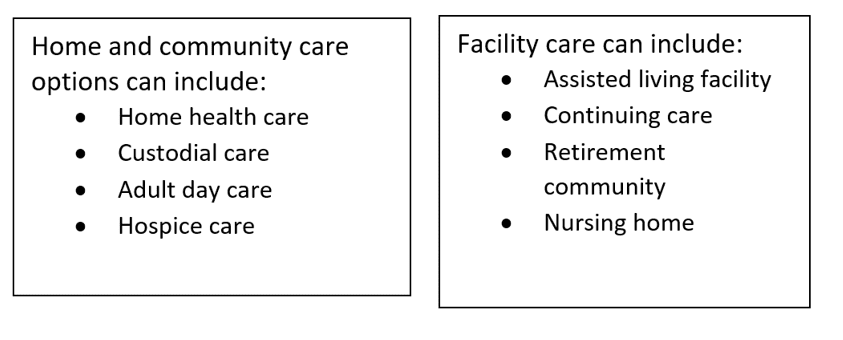Is your aging parent reaching a point where you’re concerned they’re unable to live alone safely? The realization that your parent needs long-term care is difficult to face, but it’s important to address swiftly if you feel like your parent’s well-being is at risk.
Long-term care is assistance for people who need help with activities of daily living. Received at home or in a facility, long-term care can help seniors with tasks like hygiene, chores, mobility, meal preparation and more. Long-term care services can be a literal lifesaver for seniors, helping them avoid self-neglect and fatal accidents.
Talking with aging parents about long-term care is often a difficult and uncomfortable conversation. Seniors are sometimes resistant to the conversation about long-term care due to feelings of discomfort or embarrassment—and understandably so. You would likely feel the same way if you needed help with such basic, but vulnerable tasks.
Keep reading for 5 tips to help you facilitate this difficult conversation with your parent.
1. Start having conversations sooner rather than later
Many people would rather put off this difficult conversation or avoid it altogether, but it’s important to start talking about long-term care with your aging parent as soon as possible. Don’t wait for an illness or injury to force the issue. Instead, broach this difficult conversation early—when you first start having concerns that your parent may be unable to live alone safely—so everyone has time to gather their thoughts, consider the options and develop a game plan.
2. Be prepared with specific concerns
Have you noticed your parent struggling on the stairs? Or are you concerned that they’re missing doses of medications? Jot down your observations so that you’re prepared to discuss them with your parent. Your parent may not even realize some areas of concern.
3. Get educated on long-term care options
Do some research about long-term care options in your area before talking to your parent. There are a wide variety of services available that your parent may receive at a facility, in the community or in the comfort of home. Your parent may be more open to the conversation about long-term care once they realize their options, especially if receiving in-home care is a possibility.

4. Listen and empathize
If your parent is resistant to conversations about long-term care, it’s easy to get frustrated. However, raising your voice or talking to them like a child will only leave them feeling resentful. Instead, take a step back and listen. Validate your parent’s discomfort and empathize with what they’re feeling. Calmly remind your parent that their safety is your top priority, and that long-term care might help them live in their own home longer.
5. Bring in a professional mediator
If you’ve empathized with your parent and tried to have calm conversations, but they’re still resistant to long-term care, consider bringing in a third-party mediator. A family therapist, long-term care professional or physician can help facilitate this difficult conversation and help everyone see eye to eye.
Start a long-term care conversation with your family today. Download our discussion guide to help assist with the conversation.
Keep reading: 9 things I learned during my senior parent’s crisis that can help you now
Thinking about your own future
Do conversations with your parent about long-term care have you thinking about your own future? Are you concerned about how you’ll afford the care you might need? It might be time to consider long-term care insurance, a product that’s designed to help you maintain control of where you receive care while safeguarding your savings. Get paired with a local agent to learn more.



